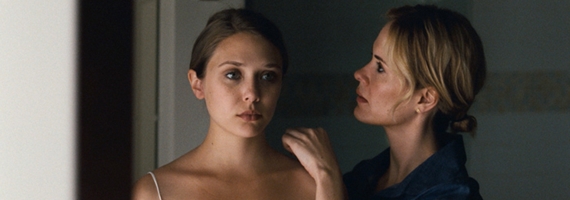Lindsay: Much like the other indie film we recently reviewed Like Crazy, MMMM has a similar trend of showcasing character-driven experiences over flat out three act storytelling. The film follows the title character Martha as she returns to her sister and only family after not contacting her for two years. Martha has a difficult time adjusting to her surroundings with her sister, and a separate story is told via flashbacks of her time away, revealing she had been involved in a cult.
The film’s subject matter, revealing storytelling techniques and performances are all powerful. Cult induction and operations are still very mysterious to most people, especially those majority of strong-minded individuals finding the concept a hard one to comprehend. The film does a fantastic job though, profiling just how easy it can be for people to be roped into a dangerous world. Cult leaders (here John Hawkes takes that role) are extremely skilled in manipulating and brainwashing people around them to achieve power. The way the film uses flashbacks is pretty brilliant, too. There are subtle references and barely-there transitions used to toggle back and forth between timelines. It may sound somewhat distracting but it works great. It actually builds a lot of tension and creates that sense of blurring paranoia that the main character is struggling with. The film’s most important ingredient is Elizabeth Olsen. She gives a beautiful and haunting performance that happens to be one of my favorites this year.
The film left me with a different feeling than I had initially anticipated feeling going in. To avoid spoilers, I won’t detail specific aspects. As I let the movie sink in and started to really think about it, I liked it more and more. It was intriguing and memorable and it ultimately made me question a lot. Right after the film was over, I thought I wouldn’t want to watch it again for some time. But now that my wheels are turning, I wouldn’t mind giving it a second viewing right now.
Jess: MMMM is a film that I left feeling somewhat conflicted. I knew that I liked it but I wasn’t sure whether it wrapped together perfectly or left much to be desired. Fortunately Rob really wanted to see this film so I went back and saw it again. After a second viewing I really think that I appreciate fully what Sean Durkin was trying to get at. Martha’s storyline of present and past really overlap more than it might seem on the surface. At her sister’s comfortable and expensive lake house Martha deals with the task of fitting into a family just as much as in the flashbacks of her at the cult where a group of people live communally with a dark, misogynistic underbelly.The behavioral norms and expectations are quite different in each place, but they boil down to a similar sense of acceptance and belonging.






